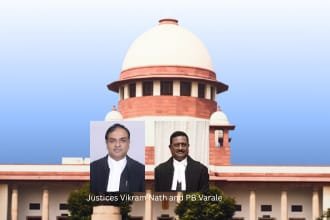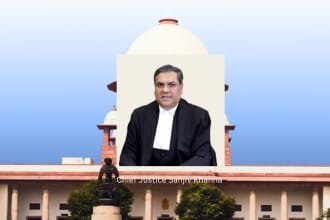In a landmark judgment that seeks to enhance transparency in the judicial process, the Supreme Court of India has issued a directive mandating that any person approaching the apex court for bail—either regular or anticipatory—must clearly disclose their criminal antecedents in the synopsis of the Special Leave Petition (SLP). The order came in the case titled Munnesh vs. State of Uttar Pradesh and was passed by a bench comprising Justice Dipankar Datta and Justice Manmohan.
This decision carries far-reaching implications for the criminal justice system and the manner in which bail petitions are drafted and submitted to the Court.
What Prompted the Supreme Court’s Direction?
The order was prompted by the growing concern among the judiciary over individuals concealing their criminal history while seeking bail from the top court. The Court observed a rising trend where petitioners withheld material facts about their past criminal records, thereby misleading the court and abusing the process of law.
In the present case, Munnesh, who was arrested in connection with a murder case under Section 302 of the Indian Penal Code, failed to disclose in his SLP that he had previously been involved in eight criminal cases, including a conviction under Sections 379 (theft) and 411 (receiving stolen property). It was only through the counter-affidavit filed by the State that the Court became aware of these facts.
The Allahabad High Court had earlier rejected his bail application in October 2023. When the matter reached the Supreme Court, it was evident that the petitioner had made a deliberate omission, thereby raising serious questions about the integrity of the information being presented before the apex court.
The Court’s Directive
The Supreme Court’s ruling makes it mandatory for all individuals filing an SLP under Sections 438/439 of the Criminal Procedure Code (CrPC)—which pertain to anticipatory and regular bail—to explicitly mention their criminal history in the synopsis section. This disclosure must include:
- Whether the petitioner has clean antecedents
- Details of any criminal cases pending or disposed of
- The current stage of proceedings in each such case
Failure to comply with this directive, or making a false disclosure, will now be considered valid grounds for outright dismissal of the bail petition.
Why This Judgment Matters
This judgment holds tremendous significance for a number of reasons:
- Restoring Credibility: By ensuring that petitioners disclose full and honest details about their criminal history, the Court aims to restore the credibility of judicial proceedings.
- Curtailing Abuse of Process: The directive seeks to prevent the misuse of legal provisions meant to protect individuals from undue harassment or incarceration, especially when the protections are sought through concealment of facts.
- Speeding Up Proceedings: In the past, courts have had to issue notices and delay proceedings due to incomplete disclosures. This step will ensure that the bench has all relevant information at the very outset.
- Balancing Rights and Responsibilities: While the right to seek bail is fundamental, it must be exercised responsibly. This ruling strikes that balance by placing a duty of full disclosure on the accused.
Background: October 2023 Orders
The recent direction follows two earlier Supreme Court orders dated October 13 and October 19, 2023, which called for more stringent mechanisms to verify the background of petitioners seeking bail. However, the Court noted with regret that these earlier steps had not achieved the desired results, thereby necessitating a more robust and enforceable approach.
The Bench emphasized that while the directive may cause inconvenience to some, institutional integrity and the proper administration of justice must take precedence.
“We are conscious that complying with this direction could result in inconvenience for some; however… we have proceeded to make the aforesaid direction in the institutional interest so that proceedings before this Court are not taken lightly… and the process of law is not abused,” the Court stated.
Implications for Legal Fraternity
Lawyers drafting bail petitions must now exercise heightened diligence and ensure that clients provide complete and honest disclosures about their criminal history. Failure to do so could not only result in dismissal of the petition but could also affect the counsel’s credibility before the bench.
Legal experts believe that this move could potentially pave the way for more stringent scrutiny of all affidavits and pleadings filed before the courts.
Reaction from the Legal Community
The ruling has received mixed reactions. While many legal professionals appreciate the move for promoting transparency and accountability, others caution that the directive must be applied judiciously to ensure that genuine applicants are not unfairly penalized for technical errors or misunderstandings about what constitutes a “criminal antecedent.”
Nevertheless, the overall consensus is that this decision will serve as a deterrent against misuse of judicial processes and help streamline bail jurisprudence in India.
What Petitioners Should Now Keep in Mind
If you’re considering approaching the Supreme Court for bail, here are a few key takeaways from the ruling:
- Be Transparent: Clearly mention all previous and pending criminal cases in your SLP.
- Include Accurate Details: Specify the current status or stage of each case.
- Avoid Misleading the Court: Any false or incomplete information could lead to immediate dismissal of your petition.
Conclusion
The Supreme Court’s directive in Munnesh vs. State of Uttar Pradesh marks a significant step toward promoting transparency, accountability, and integrity in the criminal justice system. As the judiciary grapples with the twin challenges of backlog and rising criminal cases, such measures are essential to ensure that judicial time is not wasted and that the sanctity of the legal process is preserved.
By requiring full disclosure of criminal antecedents in SLPs, the Court is sending a clear message: the legal system cannot be taken for granted, and any attempt to mislead or manipulate it will be dealt with strictly.



